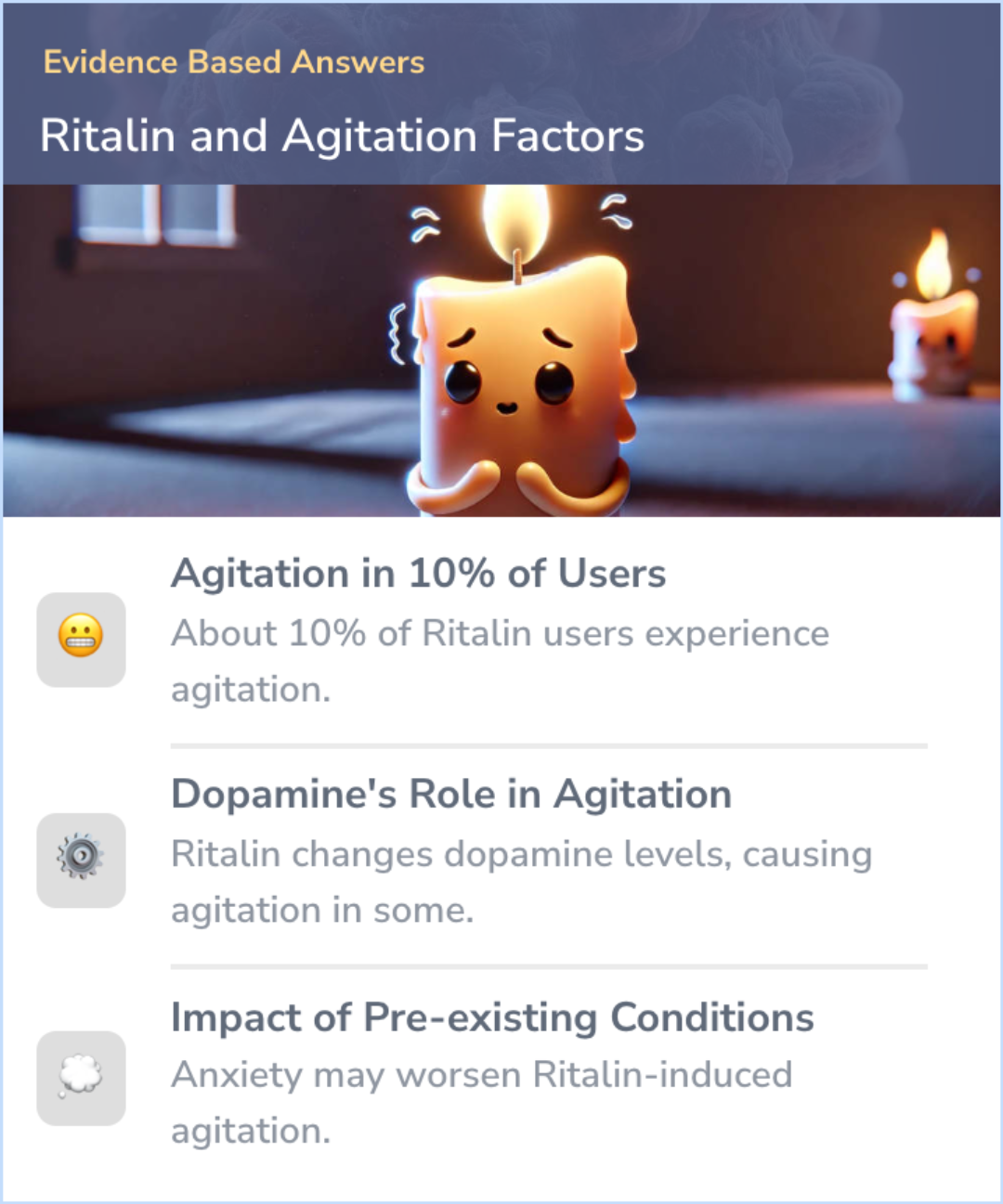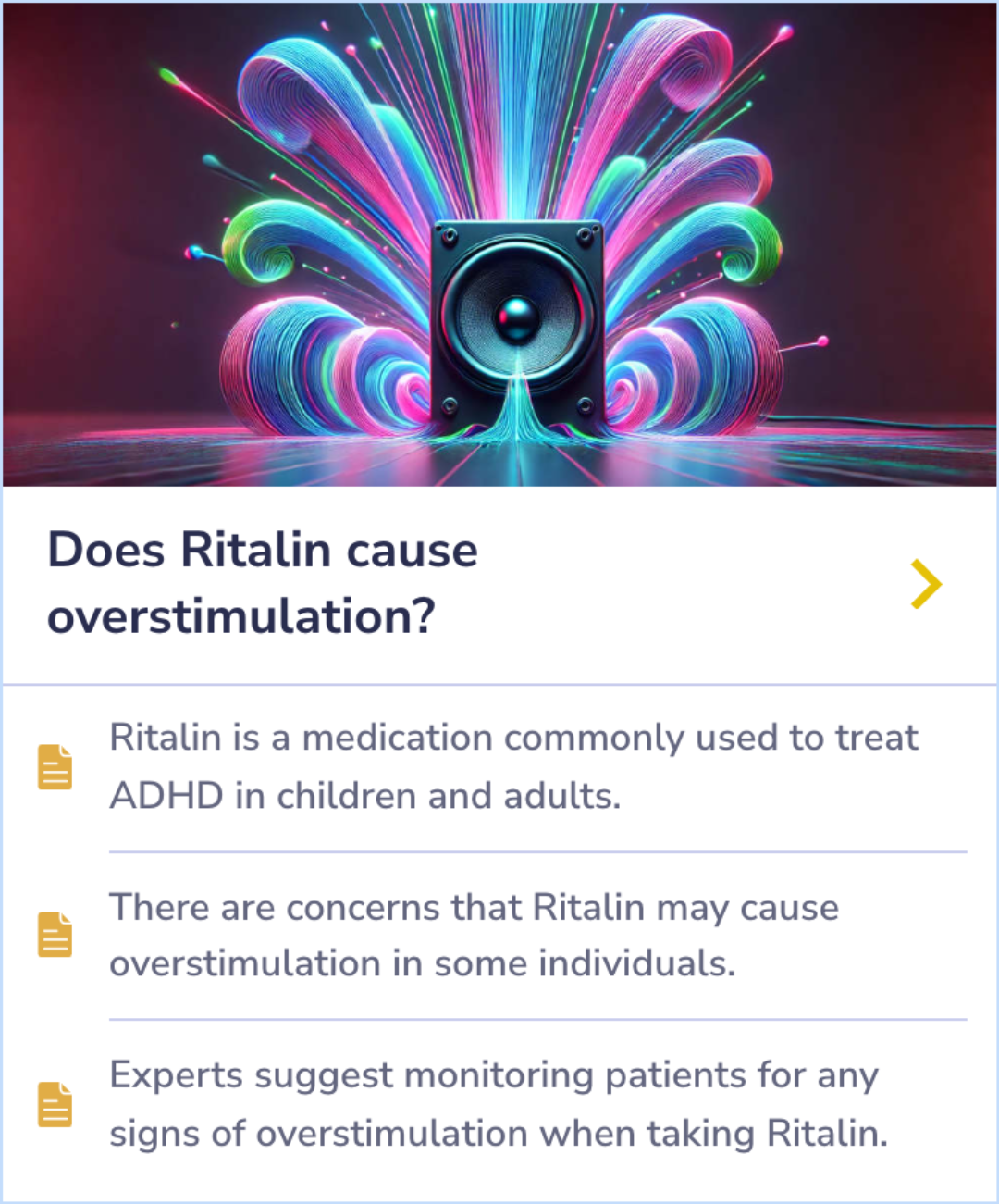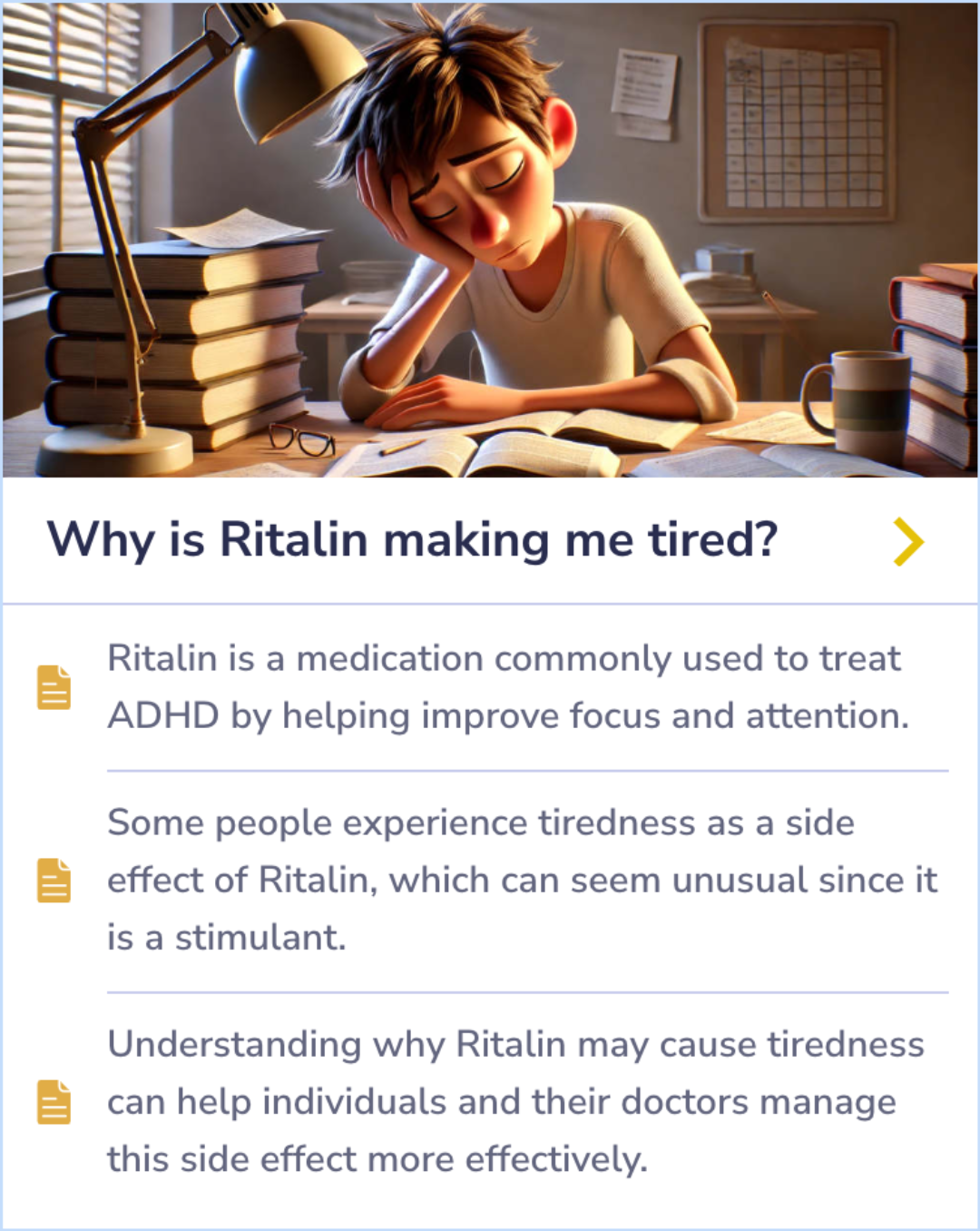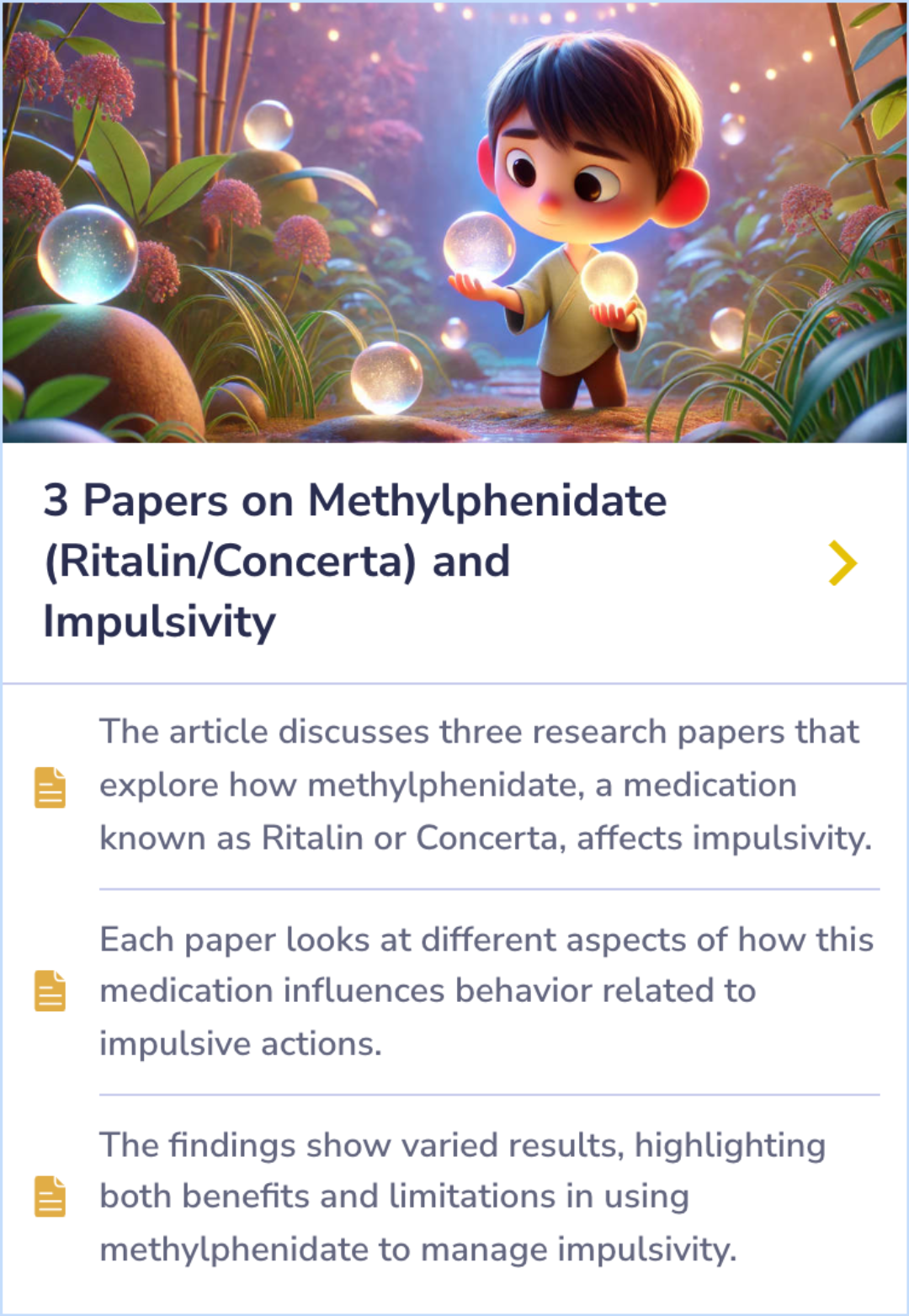Ritalin
Evidence Based Answers
Can Ritalin make you agitated?
Ritalin can cause agitation in about 10% of users, particularly those with anxiety or mood disorders. Changes in dopamine due to the medication may lead to overstimulation leading to agitation.
Published: November 7, 2024
Click to explore a section:

Ritalin may cause agitation in 10% of users, influenced by dopamine changes and existing anxiety.
Personal Experiences
Perspectives: Ritalin's Agitating Effects
In discussion on Ritalin's effects, people shared diverse experiences. Some experienced initial anxiety or agitation, which subsided over time or by adjusting intake with meals. Others managed anxiety by reducing caffeine and alcohol, or through mindfulness and exercise.
People emphasized consulting with healthcare providers for persistent issues, while highlighting Ritalin's effectiveness in improving focus despite initial side effects.
People emphasized consulting with healthcare providers for persistent issues, while highlighting Ritalin's effectiveness in improving focus despite initial side effects.
Reddit: u/turtleltrut
All stimulant based meds tend to have this effect however usually it lessens or goes away completely after a few weeks of taking it...How Common is Agitation with Ritalin Use?
Agitation is a known side effect of Ritalin (methylphenidate), affecting around 10% of long-term users. This may be more noticeable in people with conditions such as anxiety or mood disorders. Factors like dosage and individual reactions also contribute to how agitation is experienced.
Some users may feel restless or nervous due to their unique responses and health history.
Some users may feel restless or nervous due to their unique responses and health history.
“
Source Quotes:
The most common adverse events related to long-term treatment with MPH are decreased appetite (~ 20%), dry mouth (15%), heart palpitations (13%), gastrointestinal infections (~ 10%), and agitation/feeling restless (~ 10%).
Patients with an element of agitation may react adversely; discontinue therapy if necessary.
Why Does Ritalin Cause Agitation in Some People?
Ritalin affects brain chemistry by changing dopamine levels, which can increase alertness and activity. This effect can be beneficial for many but may lead to overstimulation and agitation for some users. Sensitivity to the medication varies widely, even at lower doses.
Dopamine's influence on mood and behavior means that adjustments to Ritalin can impact agitation levels, requiring careful consideration.
Dopamine's influence on mood and behavior means that adjustments to Ritalin can impact agitation levels, requiring careful consideration.
“
Source Quotes:
Methylphenidate tends to increase activity, arousal, talkativeness and mood in normal subjects.
Some individuals are sensitive to methylphenidate and suffer side effects at low doses, which in addition to anorexia and insomnia often include a short period of dysphoria and stereotypic behaviors when the serum concentrations are at peak levels.
Underlying Conditions That Can Worsen Agitation
Pre-existing conditions such as anxiety or mood disorders can heighten the risk of agitation for those taking Ritalin. These conditions may make users more susceptible to experiencing increased agitation or anxiety.
Addressing these conditions sometimes involves adjusting Ritalin dosages. In some instances, stopping the medication may be necessary to reduce symptoms.
Addressing these conditions sometimes involves adjusting Ritalin dosages. In some instances, stopping the medication may be necessary to reduce symptoms.
“
Source Quotes:
Clinicians should screen for symptoms of depression, agitation, aggressiveness, new-onset or pre-existing psychosis or mania, and suicidality as these can be worsened when initially starting methylphenidate.
Marked anxiety, tension, and agitation are contraindications to Ritalin, since the drug may aggravate these symptoms.
Managing Agitation: Dosage Adjustments
Managing agitation related to Ritalin may involve adjusting the dose or changing when it is taken. Reducing or avoiding doses later in the day can help lessen symptoms.
If agitation persists despite changes, it may be necessary to reconsider if Ritalin remains a suitable treatment option.
If agitation persists despite changes, it may be necessary to reconsider if Ritalin remains a suitable treatment option.
“
Source Quotes:
While many common side effects can be relieved by adjusting the dosage or avoiding an afternoon or evening dose, some require treatment emergently to prevent complications.
Nervousness and insomnia are the most common adverse reactions but are usually controlled by reducing dosage and omitting the drug in the afternoon or evening.
Background: Mania and Aggression
Ritalin, a stimulant medication, may contribute to aggression or hostile behavior in children and teens with ADHD. This observation comes from both clinical trials and real-world reports, where such behaviors were noted.
Additionally, in those diagnosed with both ADHD and bipolar disorder, stimulants like Ritalin can trigger manic or mixed episodes. These manic episodes involve heightened energy, impulsiveness, or irritability, highlighting a potential risk associated with the medication in certain individuals.
Additionally, in those diagnosed with both ADHD and bipolar disorder, stimulants like Ritalin can trigger manic or mixed episodes. These manic episodes involve heightened energy, impulsiveness, or irritability, highlighting a potential risk associated with the medication in certain individuals.
Key Takeaways
Conclusions
Agitation is reported in about 10% of long-term Ritalin users, often intensified in those with anxiety or mood disorders. Factors such as dosage and individual reactions affect how users experience agitation.
Ritalin alters dopamine levels, potentially leading to overstimulation and agitation. Sensitivity varies widely, suggesting treatment adjustments may be needed for effective management.
Ritalin alters dopamine levels, potentially leading to overstimulation and agitation. Sensitivity varies widely, suggesting treatment adjustments may be needed for effective management.

Evidence Summary
Monitoring Ritalin for Overstimulation Risks
Ritalin is widely prescribed to treat ADHD in both children and adults. However, some individuals may experience overstimulation, which can manifest in various ways. Monitoring patients closely is recommended to identify signs of overstimulation early.
Experts emphasize that careful oversight of Ritalin treatment can help manage any potential overstimulation effects, ensuring that therapy remains effective and safe.
Experts emphasize that careful oversight of Ritalin treatment can help manage any potential overstimulation effects, ensuring that therapy remains effective and safe.
Evidence Summary
Unexpected Tiredness from Ritalin
Ritalin is prescribed to improve focus and attention in individuals with ADHD. Despite being a stimulant, it can lead to unexpected tiredness in some users, a side effect that may seem contradictory to its intended purpose.
While enhancing focus, certain individuals experience fatigue, highlighting the diverse responses to the medication. Exploring this helps patients and healthcare providers navigate daily challenges more effectively.
While enhancing focus, certain individuals experience fatigue, highlighting the diverse responses to the medication. Exploring this helps patients and healthcare providers navigate daily challenges more effectively.
Evidence Summary
How Methylphenidate Influences Impulsivity
Three studies explore methylphenidate’s effects on impulsivity, focusing on behavior and decision-making. Each study examines different ways this medication, known as Ritalin or Concerta, might influence impulsive actions.
Results vary across the studies, showing both potential benefits and some limitations in using methylphenidate to manage impulsive behavior, reflecting a complex picture of its impact on impulsivity.
Results vary across the studies, showing both potential benefits and some limitations in using methylphenidate to manage impulsive behavior, reflecting a complex picture of its impact on impulsivity.


